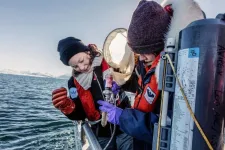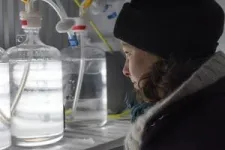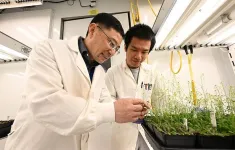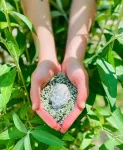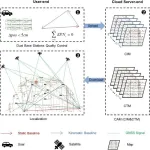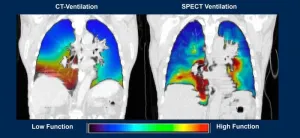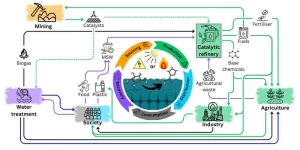(Press-News.org) The basis of the marine food web in the Arctic, the phytoplankton, responds to heatwaves much differently than to constantly elevated temperatures. This has been found by the first targeted experiments on the topic, which were recently conducted at the Alfred Wegener Institute’s AWIPEV Station. The phytoplankton’s behaviour primarily depends on the cooling phases after or between heatwaves, as shown in a study just released in the journal Science Advances.
Heatwaves, which we’ve increasingly seen around the globe in recent years, are also becoming more and more common in the Arctic. During a heatwave, not only the air but also the ocean grows warmer – the temperature is substantially higher than the seasonal mean value for at least five consecutive days. But how these short-term temperature fluctuations affect polar organisms remains largely unclear. To shed light on this aspect, a team led by Dr Klara Wolf (Universities of Hamburg and Konstanz) and Dr Björn Rost from the Alfred Wegener Institute, Helmholtz Centre for Polar and Marine Research (AWI) has now used experiments to investigate how single-cell algae, the phytoplankton, respondact to these extreme events. Given the phytoplankton’s role as the basis of the marine food web, changes in it could resonate throughout the entire Arctic ecosystem.
In incubation experiments at the AWIPEV Station in Svalbard, the researchers allowed natural phytoplankton communities from nearby Kongsfjorden to grow for 20 days under various conditions – normal and increased but constant temperatures (2° C, 6° C, 9° C). For comparison, they subjected the phytoplankton to repeated heatwaves of varying intensity (6° C, 9° C) , each lasting five days with a three-day cooling phase at the seasonal mean temperature (2° C) in between. Different types of samples were collected at defined intervals in order to characterise the physiological responses and any potential species shifts.
“Under stable temperatures, even an extreme increase of +7° C led to accelerated growth and higher productivity, with surprisingly small changes in the composition of species, even over weeks,” says Klara Wolf regarding the experiments’ outcomes. “In contrast, the effects of heatwaves are considerably more complex and don’t follow the same pattern. This implies that our knowledge about constant temperature increases cannot readily be applied to these short-term warm phases, which normally only last a few days.” One reason for the difference is apparently that not just the exposure to increased temperatures has a major impact on productivity, but also and especially the cooling phases after or between heatwaves – and very little is known about these effects.
“We’re only just starting to gain a mechanistic understanding of how heatwaves can impact the polar regions,” says AWI biologist Björn Rost. “Our study represents an important first step and shows which aspects of heatwaves and which phytoplankton-related processes we need to take a closer look at. In addition, our study shows that what we know about the processes and effects of constantly higher temperatures can’t simply be applied one-to-one.” In fact, scenarios involving fluctuating temperatures can produce a broad range of effects, which is why predicting their implications is more complicated than for continuous warming.
Accordingly, in order to develop better projections and models regarding how primary production and the Arctic ecosystem will change in response to climate change, it won’t suffice to investigate the effects of mean temperatures; the effects of temperature fluctuations need to receive more attention. While stable warming up to a certain temperature increases productivity, some heatwaves can decrease it, while others increase it. A better grasp of the effects of variable temperatures, especially the cooling phases, is therefore essential to improving forecasts on potential biodiversity changes. Investigations on phytoplankton are hereby most crucial, since changes at the basis of the food web can impact all higher trophic levels, all the way up to fisheries.
END
How heatwaves are affecting Arctic phytoplankton
Experiments conducted at the AWIPEV Station in Svalbard on this increasingly common phenomenon
2024-05-17
ELSE PRESS RELEASES FROM THIS DATE:
NUS scientist Professor Lim Chwee Teck elected Fellow of the Royal Society
2024-05-17
Professor LIM Chwee Teck, Director of the Institute for Health Innovation & Technology at the National University of Singapore (NUS iHealthtech) and NUSS Professor, has been elected to the prestigious Fellowship of the Royal Society, in recognition of his invaluable contributions to science.
The Royal Society is the world's oldest and most esteemed scientific academy in continuous existence, as well as the United Kingdom’s national academy of sciences. Fellows are elected annually, and candidates are evaluated based on their exceptional achievements in science. This ...
Modern plant enzyme partners with surprisingly ancient protein
2024-05-17
UPTON, N.Y. — Scientists from the U.S. Department of Energy’s (DOE) Brookhaven National Laboratory have discovered that a protein responsible for the synthesis of a key plant material evolved much earlier than suspected. This new research explored the origin and evolution of the biochemical machinery that builds lignin, a structural component of plant cell walls with significant impacts on the clean energy industry.
When the first land plants emerged from aquatic environments, they needed to adapt in order to survive.
Chang-Jun Liu, a senior scientist in Brookhaven’s Biology ...
Ion irradiation offers promise for 2D material probing
2024-05-17
Two-dimensional materials such as graphene promise to form the basis of incredibly small and fast technologies, but this requires a detailed understanding of their electronic properties. New research demonstrates that fast electronic processes can be probed by irradiating the materials with ions first.
A collaboration involving researchers at the University of Illinois Urbana-Champaign and the University of Duisburg-Essen has shown that when graphene is irradiated with ions, or electrically charged atoms, the electrons that are ejected ...
Scientists develop new geochemical ‘fingerprint’ to trace contaminants in fertilizer
2024-05-17
DURHAM N.C. – An international team of scientists has uncovered toxic metals in mineral phosphate fertilizers worldwide by using a new tool to identify the spread and impact of such contaminants on soil, water resources, and food supply.
“While mineral phosphate fertilizers are critical to boost global sustainable agriculture and food security, we found high levels of toxic metals in many fertilizers worldwide,” said Avner Vengosh, chair of the Earth and Climate Sciences division at Duke University’s Nicholas School of the Environment. “Our study developed a new method to identify sources and impacts of these metals on the environment.” Those ...
From the road to the cloud: leveraging vehicle GNSS raw data for spatial high-resolution atmospheric mapping and user positioning
2024-05-17
Innovative Global Navigation Satellite System (GNSS) positioning technologies harness massive vehicle-generated data to create high-resolution atmospheric delay correction maps, significantly enhancing Global Positioning System (GPS) accuracy across varied spatial scales. This new method exploits real-time, crowd-sourced vehicle GNSS raw data, refining traditional GPS applications and presenting a cost-effective solution for precise positioning.
The quest for enhanced Global Navigation Satellite System (GNSS) accuracy has been hindered ...
Study suggests that air pollution promotes inflammation in the brain, accelerating cognitive decline and increasing risk of dementia
2024-05-17
Results from new study suggests that long-term exposure to air pollution leads to increased risk in dementia in Denmark.
"We also find association with noise, but this seems to be explained by air pollution primarily. Our study is in line with growing international knowledge on this topic." says Professor at Section of Environmental Health Zorana Jovanovic Andersen.
This is an important finding which adds that air pollution, beyond well-known effects on respiratory and cardiovascular system, also has major impacts on our brain, promoting inflammation in the brain, accelerating cognitive decline, and increasing ...
New imaging software improves lung diagnosis for 30% of patients who can't tolerate contrast dye; has added diagnostic benefits for all patients
2024-05-17
Southfield, Mich., May 17, 2024 – For up to 30% of patients who are allergic to medical contrast dye or have a dye restriction because of other health conditions, they might find that it takes longer to get a diagnosis when it comes to life-threatening lung issues such as pulmonary embolism. That's because imaging methods that detect lung problems but don't use contrast dye aren't as accurate and can be more time-consuming to administer.
Now, new imaging software, developed by pulmonologist Girish Nair, M.D., with Corewell Health William Beaumont University Hospital in Royal Oak, Michigan, and biomedical ...
A trial HIV vaccine triggered elusive and essential antibodies in humans
2024-05-17
DURHAM, N.C. – An HIV vaccine candidate developed at the Duke Human Vaccine Institute triggered low levels of an elusive type of broadly neutralizing HIV antibodies among a small group of people enrolled in a 2019 clinical trial.
The finding, reported May 17 in the journal Cell, not only provides proof that a vaccine can elicit these antibodies to fight diverse strains of HIV, but that it can also initiate the process within weeks, setting in motion an essential immune response.
The vaccine candidate targets an area on the HIV-1 outer envelope called the membrane proximal external region (MPER), which ...
Can we revolutionise the chemical industry and create a circular economy? Yes, with the help of catalysts
2024-05-17
The chemical industry is a cornerstone of global development, driving innovation, and providing essential products that support our modern way of life.
However, its reliance on unsustainable fossil resources has posed significant threats to global ecosystems through climate change and chemical pollution.
A new commentary published in Cell Press’ OneEarth co-authored by Griffith University researchers puts forth a transformative solution: catalysis to leverage sustainable waste resources, ushering the industry from a linear to a circular economy.
“If ...
Rutgers researchers identify impacts of Russia-Ukraine war on hospitals
2024-05-17
Rutgers researchers, aided by international collaborators, have tracked the devastation war has made on Ukraine’s hospital system.
Hundreds of hospitals in Ukraine have been forced to close or operate at a reduced capacity since Russia’s invasion of the Eastern European country in February 2022. Damage, destruction and supply shortages caused by the war have impaired the nation’s hospital system and taken a serious toll on human health.
In a study published in JAMA, Rutgers researchers and collaborators from the United States, Pakistan and Ukraine collected and compared data on hospital services provided both during ...
LAST 30 PRESS RELEASES:
Scientists reveal our best- and worst-case scenarios for a warming Antarctica
Cleaner fish show intelligence typical of mammals
AABNet and partners launch landmark guide on the conservation of African livestock genetic resources and sustainable breeding strategies
Produce hydrogen and oxygen simultaneously from a single atom! Achieve carbon neutrality with an 'All-in-one' single-atom water electrolysis catalyst
Sleep loss linked to higher atrial fibrillation risk in working-age adults
Visible light-driven deracemization of α-aryl ketones synergistically catalyzed by thiophenols and chiral phosphoric acid
Most AI bots lack basic safety disclosures, study finds
How competitive gaming on discord fosters social connections
CU Anschutz School of Medicine receives best ranking in NIH funding in 20 years
Mayo Clinic opens patient information office in Cayman Islands
Phonon lasers unlock ultrabroadband acoustic frequency combs
Babies with an increased likelihood of autism may struggle to settle into deep, restorative sleep, according to a new study from the University of East Anglia.
National Reactor Innovation Center opens Molten Salt Thermophysical Examination Capability at INL
International Progressive MS Alliance awards €6.9 million to three studies researching therapies to address common symptoms of progressive MS
Can your soil’s color predict its health?
Biochar nanomaterials could transform medicine, energy, and climate solutions
Turning waste into power: scientists convert discarded phone batteries and industrial lignin into high-performance sodium battery materials
PhD student maps mysterious upper atmosphere of Uranus for the first time
Idaho National Laboratory to accelerate nuclear energy deployment with NVIDIA AI through the Genesis Mission
Blood test could help guide treatment decisions in germ cell tumors
New ‘scimitar-crested’ Spinosaurus species discovered in the central Sahara
“Cyborg” pancreatic organoids can monitor the maturation of islet cells
Technique to extract concepts from AI models can help steer and monitor model outputs
Study clarifies the cancer genome in domestic cats
Crested Spinosaurus fossil was aquatic, but lived 1,000 kilometers from the Tethys Sea
MULTI-evolve: Rapid evolution of complex multi-mutant proteins
A new method to steer AI output uncovers vulnerabilities and potential improvements
Why some objects in space look like snowmen
Flickering glacial climate may have shaped early human evolution
First AHA/ACC acute pulmonary embolism guideline: prompt diagnosis and treatment are key
[Press-News.org] How heatwaves are affecting Arctic phytoplanktonExperiments conducted at the AWIPEV Station in Svalbard on this increasingly common phenomenon
